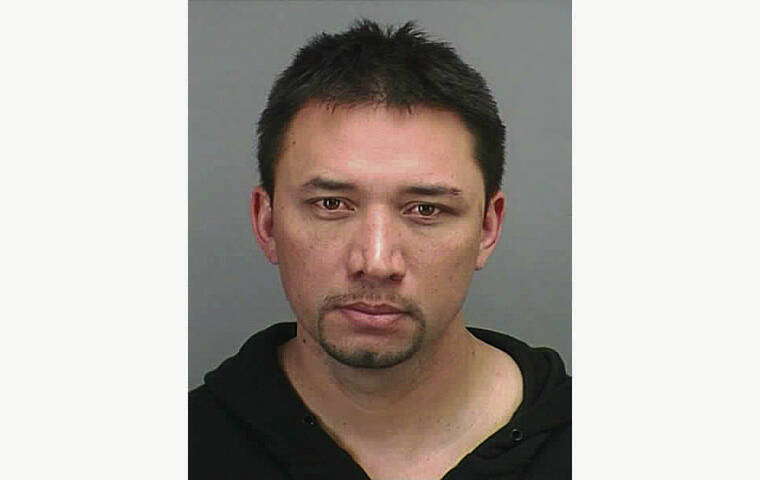Accused crime boss Miske’s case goes to the jury

COURTESY HPD
Micheal J. Miske Jr.
Ninety-eight days after federal prosecutors began trying to prove Michael J. Miske Jr. was a notorious Hawaii crime lord instead of a benevolent businessmen providing essential services to homeowners, businesses and county government, Miske’s fate now rests with a jury.
Jury deliberations begin Monday following 241 witnesses called by the U.S. Department of Justice and work by Miske’s defense team to describe a totally different man.
On Thursday, U.S. Attorney Mark. A. Inciong reminded jurors that there are 14 standards that can be used to convict him of a Racketeer Influenced and Corrupt Organizations conspiracy charge, but they need only two.
”One robbery, one kidnapping … only two … so I just want to be clear there were multiple incidents,” said Inciong, speaking in court Thursday while walking the jurors through an overhead projection of the RICO conspiracy requirements.
Miske is facing 16 separate criminal charges and stood trial alone after his alleged co-conspirators John Stancil, Dae Han Moon, Preston M. Kimoto, Miske’s daughter-in-law Delia-Anne Fabro-Miske, Jarrin Young and Jason K. Yokoyama accepted a plea deal from federal prosecutors.
His attorneys described Miske as a legitimate businessman who gave back to the community.
Don't miss out on what's happening!
Stay in touch with breaking news, as it happens, conveniently in your email inbox. It's FREE!
The government alleged that Miske controlled the illegal markets popular in Hawaii and owned nightclubs where brawls over bar tabs were common. The Miske enterprise allegedly made millions of dollars selling illegal commercial-grade aerial fireworks on the black market.
Federal prosecutors said Miske wanted people killed, and they believe many acts were never carried out.
But federal prosecutors maintain, and Miske denies, the 2016 killing of Johnathan Fraser, best friend to Miske’s only son, Caleb.
The federal government alleged that starting in the late 1990s until 2020, Miske and his associates ran the “Miske Enterprise” through a pattern of racketeering activity.
The racketeering activity included acts involving murder, kidnapping, arson and robbery, according to federal prosecutors.
Miske was building family business Kama‘aina Termite and Pest Control into an industry leader and started solar and plumbing businesses.
Miske fumigated numerous “cultural treasures” in Hawaii, and highlighted his pro bono work to tent the Neal S. Blaisdell Center when the city could not afford it.
Miske, 49, was a local boy who worked hard to build a better life, his attorneys and family swore.
They described him as a self-made man who overcame adversity growing up to build his businesses.
In June, Chief U.S. District Judge Derrick K. Watson dismissed attempted murder and firearm charges against Miske related to a May 2017 attack at Kualoa Ranch, according to federal court records.
The charges of assault and attempted murder in aid of racketeering and carrying and using a firearm during and in relation to a crime of violence were dismissed. They were related to a May 23, 2017, incident where Miske associate Lindsey Kinney alleges he was attacked for declining to kill Fraser, the 21-year-old who federal prosecutors allege Miske blames for the death of his son.
Miske denied blaming Fraser or wanting him dead.
Watson ruled that there was sufficient evidence to proceed with charges alleging the use of chloropicrin in a spate of March 2017 nightclub attacks, allegedly ordered by Miske.
Police seized excess quantities of the chemical stored in a Jagermeister bottle during a traffic stop.
Assistant U.S. Attorney Mark A. Inciong, Michael David Nammar, William KeAupuni Akina and Aislinn Affinito prosecuted the case.
Miske was defended by Lynn E. Panagakos and Michael Jerome Kennedy.



